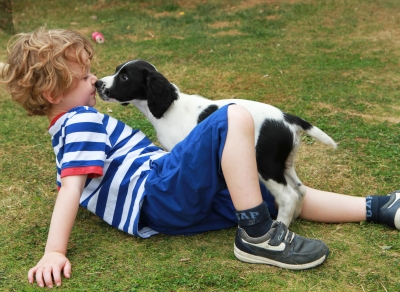Children don’t know the risks involved when they play with animals. They aren’t aware that they can get bitten or that they can get sick from bacteria or viruses that animals can transfer to them. Kids just want to play, which is why parents should always be vigilant when it comes to kids and dogs. Things can get sour quickly. It only takes a few seconds for a dog to bite, and biting accidents can happen right under your nose.
First Aid for Dog Bite
When a dog bites your child, it is important to clean the wound. A gentle soap can be used to wash the injured area. Rinse with running water and then dry with a clean towel. Afterwards, go to your pediatrician to have the wound checked. For injuries wherein there’s excessive bleeding, the most important thing to do is stop the bleeding. For instance, if the area near under the knee is profusely bleeding, get a piece of cloth or a bandage and wrap this above the injured site. The pressure will help reduce the bleeding. Then, seek medical help as soon as possible as heavy bleeding can lead to life-threatening blood loss.
The Responsible Dog
It is easier if you own the dog that bit your child. Because the animal is yours, you have easy access to its medical or health records. So, you can readily check if it’s immunized against rabies and other harmful bacteria or viruses. Show the animal’s records to your child’s doctor so that he can suggest what steps to take. Your pediatrician, for example, could suggest that you wait for two weeks before subjecting your child to anti-rabies shots, particularly if your dog is protected against the disease. If your child is done with the required series of rabies shots, then the doctor could suggest getting a booster shot. He may also prescribe antibiotics to prevent infection since a dog’s teeth, tongue, and saliva are ridden with harmful bacteria.
If you don’t know the dog that bit your kid, you can try looking for its owner. Finding a dog’s owner is beneficial in two ways. First, once you discover the dog’s owner, you can ask for the animal’s records so that you can bring this with you to your pediatrician. Second, this helps you determine who is responsible for the dog and for the attack.
If you really cannot find the dog responsible for the attack, get in touch with animal control or your local health office. In cases like these, your child may have to be given rabies immune globulin and rabies vaccine within 2 days or 48 hours after the biting incident. Doctors can also prescribe tetanus shots and other vaccinations for those bitten by strays or unknown dogs. It is important to follow doctor’s orders to avoid serious complications. Furthermore, if your child notices something abnormal, bring him back to the hospital. Have him checked for nerve damage and other problems that may be related to the biting incident.
Taking Legal Steps
A personal injury lawsuit can be filed against the owner of the responsible dog. If you’re planning on filing a case, it’s important to file a report to animal control because you can use this as evidence. Photos of the injury, the dog, the place where the biting accident took place can also be used to support your case. Make sure that you have medical records, and take note of the contact details of witnesses as the court can call them to recount what occurred.
Citations:
- Photo courtesy of Tina Phillips at FreeDigitalPhotos.net.
Claire Wolfe is a freelance blogger who writes for Fannin Litigation Group and other respected law firms. She specializes in personal injury cases concerning dog or animal bite accidents.

